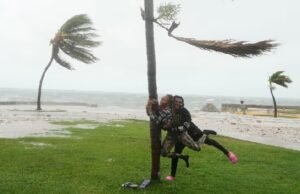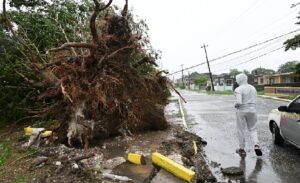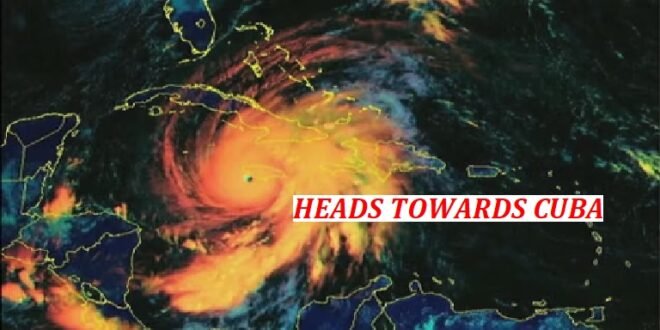30-10-2025
KINGSTON/ HAVANA: Heavy floodwaters swept across southwestern Jamaica, winds tore roofs off buildings and boulders tumbled into roads Tuesday as Hurricane Melissa came ashore as a catastrophic Category 5 storm, tied for the strongest landfalling Atlantic hurricanes in history.
 The storm landed in southwestern Jamaica near New Hope and is expected to exit around St. Ann parish in the north, forecasters said. The storm is expected to slice diagonally across the island, then head for Cuba. It has been blamed for at least seven deaths so far in the Caribbean, three in Jamaica, three in Haiti and one in the Dominican Republic.
The storm landed in southwestern Jamaica near New Hope and is expected to exit around St. Ann parish in the north, forecasters said. The storm is expected to slice diagonally across the island, then head for Cuba. It has been blamed for at least seven deaths so far in the Caribbean, three in Jamaica, three in Haiti and one in the Dominican Republic.
Landslides, fallen trees and numerous power outages were reported ahead of Melissa’s landfall, with officials in Jamaica cautioning that the cleanup and damage assessment would be slow.
“There is no infrastructure in the region that can withstand a Category 5,” Jamaican Prime Minister Andrew Holness said Monday. “The question now is the speed of recovery. That’s the challenge.”
Heavy floods and landslides reported in southwestern Jamaica: On Tuesday night, Melissa had top sustained winds of 125 mph and was moving north-northeast at 8 mph as its center moved into the Caribbean Sea, according to the US National Hurricane Center in Miami.
Cuba is next at risk; the storm is expected to make landfall late Tuesday or early Wednesday in eastern Cuba, where hundreds of thousands of people have prepared to evacuate. Up to 20 inches (51 centimeters) of rain are forecast in areas, with a significant storm surge along the coast. The hurricane is expected to reach the southeastern Bahamas by Wednesday evening.
Warming oceans fuel Melissa’s ferocity; the warming of the world’s oceans caused by climate change helped double Hurricane Melissa’s wind speed in less than 24 hours over the weekend, climate scientists said Monday. Scientists said this is the fourth storm in the Atlantic this year to undergo rapid intensification of its wind speed and power.
 The International Federation of Red Cross and Red Crescent Societies (IFRC) is warning that at least 1.5 million people in Jamaica alone may experience the repercussions of Hurricane Melissa.
The International Federation of Red Cross and Red Crescent Societies (IFRC) is warning that at least 1.5 million people in Jamaica alone may experience the repercussions of Hurricane Melissa.
Robian Williams, a journalist for the Kingston-based radio station Nation-Wide Radio 90FM, told media that the wind gusts had “toppled trees and downed power lines”.
“Many of us here are out of electricity. First responders are actually out on the road just trying to clear the blockade,” she said.
Some 25,000 tourists are currently on the island. As they ride out the storm, the office of Prime Minister Andrew Holness has said that hoteliers are offering “distress rates” and shelter spaces for those stranded.
Holness said Jamaica had received calls of support from the United Nations, the United States, the European Union, the United Kingdom and France, as well as other Caribbean nations.
Jens Laerke, spokesperson for the UN humanitarian agency, OCHA, said the top priority was “to save as many lives as possible”.
“When you have massive flooding, one of the biggest problems is water”, he said, warning of “all kinds of health risks and epidemic risks” without clean water.
Jamaica’s South East Regional Health Authority issued a crocodile alert, warning on Instagram that large reptiles displaced by rapidly rising waters in rivers, gullies and swamps could “move into residential areas”. (Int’l News Desk)
 Pressmediaofindia
Pressmediaofindia




